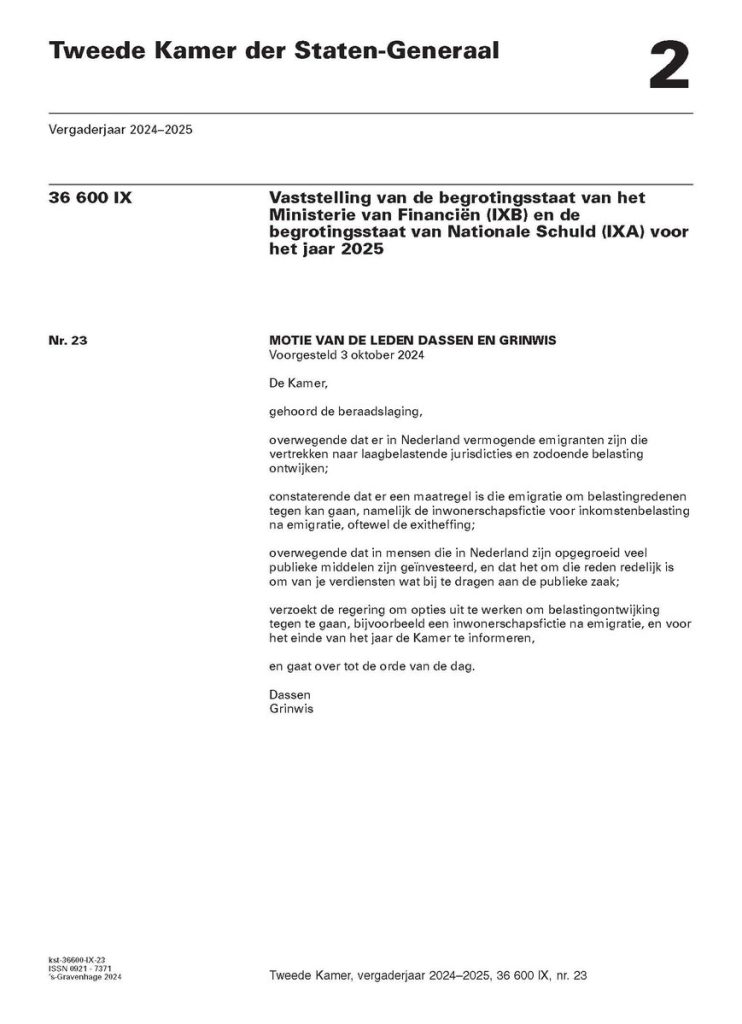New Exit Tax in the Netherlands

What does the possible introduction of a new exit tax in 2025 mean for you? In this article we discuss the exit tax and its possible consequences for Dutch citizens who want to move their tax residence to Dubai. We also look at how realistic this law is now when we compare the exit tax with international treaties. In this article we provide more insight into which (in)certainties there are about the tax for investors and emigrants.
In 1950, the Netherlands had 14 million inhabitants.
Queen Juliana declared: 'The Netherlands is full, full, full.'
You received a subsidy to emigrate.
In 2024, the Netherlands has 18 million inhabitants.
You will have to pay to emigrate.
What is the exit tax and why do we have it?
Exit tax (also known as emigration tax) is a tax imposed when a resident of one country moves his tax residence abroad. This means that the tax authorities of the country of departure can levy tax on latent profits from assets. Such as shares and real estate, as if they were sold at the time of departure.
For both Belgian and Dutch investors, this tax is a serious consideration when emigrating to Dubai, where there is no income tax, capital gains tax or wealth tax. The exit tax obliges you as a citizen to first pay tax on the profits built up in their home country before emigrating. It is therefore made difficult to “take your accumulated assets with you to another country”.
The focus is therefore on preventing tax avoidance by wealthy individuals and entrepreneurs who move to countries with a favourable tax climate, such as Dubai. In October 2024, the States General adopted a motion to prepare a new exit tax. This is expected to come into effect in 2025.
What does the new exit tax entail?
The new exit tax is based on the German system, where emigrants may still owe tax for up to five years after departure on international income and capital gainsThis means that the Netherlands can continue to levy tax on profits earned outside the Netherlands even after emigration. Even if someone moves to a tax-free country such as Dubai.
Seven to eight countries, including Germany, have already introduced similar exit taxes. In Germany, for example, shares and other assets are taxed for up to five years after emigration. These taxes are intended to prevent citizens from “avoiding their tax obligations” by moving to tax havens …
This new exit tax would allow the Dutch Tax Authorities to levy tax on international income and capital gains in the years after departure... Then the tax authorities would have to come up with a solution for the blue envelopes, because we don't have mailboxes in Dubai!
But wait!? We forget the importance of international treaties!
Although the new exit tax is an important step for the Netherlands to combat tax avoidance through emigration, it is important to know:
International treaties supersede national legislation.
The Netherlands is therefore dependent on the consent of other countries in order to actually impose the exit tax.
This means that the Dutch government may have nice ideas, but the implementation of them is not that simple. In the case of emigration to the United Arab Emirates, such as Dubai, the tax treaty between the Netherlands and the UAE will have to state that this exit tax is recognized and maintained. Without such a treaty, the Dutch tax can have little effect. This is because the UAE is not obliged to cooperate in the collection of Dutch taxes. This also applies to other countries where wealthy Dutch people may move to.
Why would the Dubai government agree to levying tax from abroad,which reduces and deteriorates the purchasing power and economy of Dubai?
In short, although the Netherlands can legally introduce the exit tax, the effectiviness is dependent on international cooperations. If there is no agreement with the United Arab Emirates or other countries, the Dutch government can enforce little. In addition, levying tax on international wealth remains a challenge.
Uncertainties about the New Exit Tax
Although the introduction of the exit tax in 2025 is a probability, some uncertainties remain:
- Income limit: It is still unclear to whom this exit tax will apply. Will the measure only apply to very wealthy Dutch people, or will the scheme affect a broader group?
- Tax residency: How the Tax and Customs Administration determines whether someone has actually moved their tax residence, and what happens if someone temporarily returns to the Netherlands, is not yet clear. Dubai is not keen on releasing information about its residents.
- International cooperation: As mentioned before, the enforcement of the exit tax depends on the willingness of other countries. Such as the United Arab Emirates, to cooperate in tax collection. Without international agreements, the Netherlands cannot enforce that other countries respect the exit tax.
Advice on the New Exit Tax
Leave as soon as possible!
Conclusion
The proposed exit tax in the Netherlands, which could come into effect in 2025, will significantly change the tax rules for emigrants. By extending the tax claim for up to five years after departure on international income and capital gains, wealthy Dutch citizens and entrepreneurs who want to emigrate to Dubai will be affected.
It is important to remember that the effectiveness of this exit tax depends on international treatiesWithout cooperation and agreements with countries such as the United Arab Emirates, the Dutch government has limited control over the levying of taxes on capital gains of its former residents.
What's going to happen? We'll keep you updated in our blogs or follow our Whatsapp groups for updates on legislation and projects:
Motion for the Exit Tax:

Article references: Staten Generaal | Tweede Kamer | Taxes | Belastingdienst |